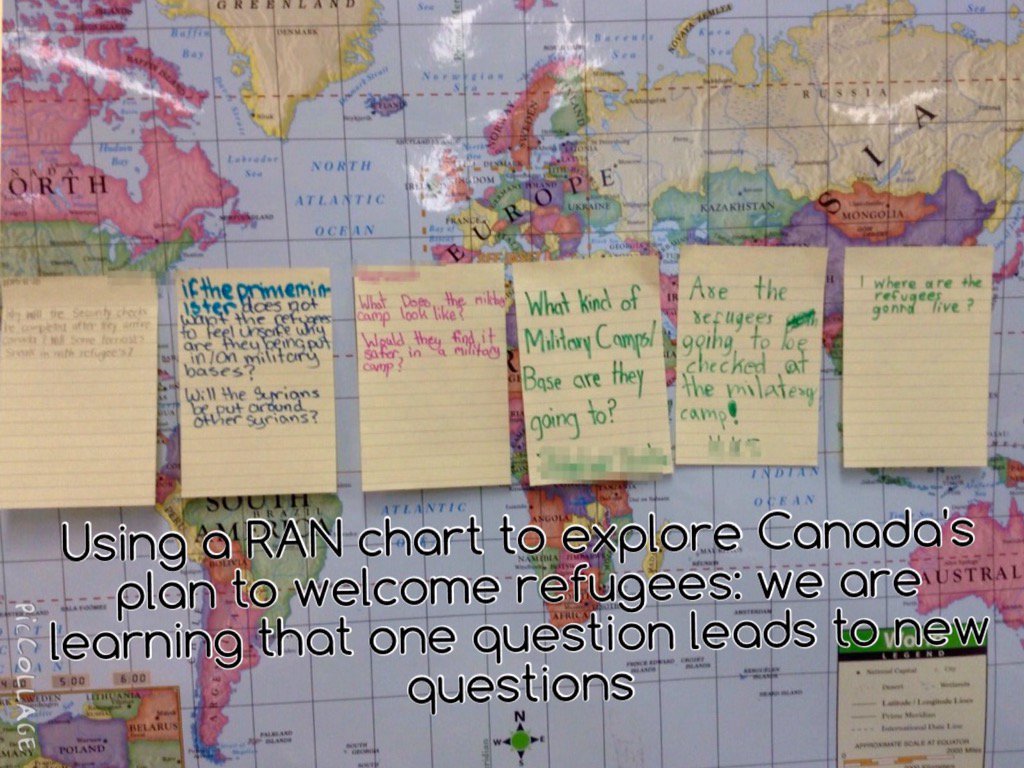The information below is designed to invite coaches and curriculum leaders to consider the directions they can take in regards to the inquiry process
What
resonates with you?
______________________________________________________
“The great end of education is to discipline rather than to furnish the mind; to train it to the use of its own powers rather than to fill it with the accumulation of others.” — Tyron Edwards
______________________________________________________
What does a #knowledgebuilding classroom sound like?
Students paraphrasing each other to build their knowledge and understanding "so what you're saying is..." As well as adding on to an idea
______________________________________________________
A2 disciplinary thinking is engaging. By addressing it we might be more likely to pose tasks that are concerned with real issues
@rajalingam
______________________________________________________
"inquiry" ...works well when students are comfortable at looking at failing in a different way: F.A.I.L - First Attempt In Learning!
@sillebob
______________________________________________________
Too often we give children answers to remember rather than problems to solve
@Primary_Ed
______________________________________________________
How do inquiry teachers teach? (reflection)
4. They let kids in on the secret – inquiry teachers have a transparent style. It’s not just about putting learning intentions up on the wall – they constantly ensure their kids know why they are doing what they are doing. Inquiry teachers often think aloud – they reveal the complexities and the joys of learning to their students by being a learner.
katemurdoch
______________________________________________________
______________________________________________________
Observations from the field
Use inquiry circles to get started with inquiry
Intermediate Inquiry Circles from adp center on Vimeo.
http://vimeo.com/23329676
See how this teacher models the process for developing wonder and questions that can lead to inquiry. (Watch the first 3 minutes of the clip)
Intermediate Inquiry Circles from adp center on Vimeo.
http://vimeo.com/23329676
See how this teacher models the process for developing wonder and questions that can lead to inquiry. (Watch the first 3 minutes of the clip)
 Teachers take a deliberate approach to
teach the language of inquiry - talk on task, accountable talk
Teachers take a deliberate approach to
teach the language of inquiry - talk on task, accountable talk
Teachers can built the culture of inquiry by providing opportunities for students to develop the language of inquiry.
Consider some of the video clips on the Accounts Talk Blog post
Consider some of the video clips on the Accounts Talk Blog post
TDSB teachers can also see how to integrate these ideas in meaningful ways through the following supports (requires AW login):
- Approaches to Teaching Lesson Series - Accountable Talk
- Geography Grade7/8 Teaching Supports (integrates accountable talk related to disciplinary thinking)
For example , see the video on developing good inquiry questions
As teachers connect guiding questions with success criteria and assessment they determine their role in the process
For example, monitoring the process, provide feedback, teach specific lessons focusing on content and skills
Supports
- TDSB teachers (requires AW login) can access Approaches to Inquiry - 25 lessons devised to support particular aspect of inquiry and the use of disciplinary thinking.
- OESSTA has created lessons to support inquiry and disciplinary thinking for all teachersSee Math, Language, Spatial Skills Resources
- The Ministry of Education has designed some supports as well.
See Financial Literacy
 Practicing different approaches to develop and improve questions is integral to student inquiry
Practicing different approaches to develop and improve questions is integral to student inquiry
Teachers work with students to sort and value all types of questions. See Developing Questions page for details.
 Tools to support the
inquiry are used on a regular basis - RAN Organizer
Tools to support the
inquiry are used on a regular basis - RAN Organizer
The RAN organizer becomes the tool that teachers can use as the inquiry progresses throughout the unit.
RAN Inquiry Guide
 Thinking
Thinking
RAN Inquiry Guide
See how one teacher has adapted the model
Reflection:
- Can your students benefits from organizers?
- How can the RAN organizer support teaching and learning?
 Thinking
Thinking
Inquiry creates an environment that welcomes and requires thinking (critical thinking, disciplinary thinking)
Teachers need to
praise the thinking (attention to detail)
During class discussions: if you want others to
respond - ask does anyone have a different response or opinion?
Assess their thinking
and not their answers
Provide opportunities to make observations and inferences
See resource video using images
Provide opportunities to make observations and inferences
See resource video using images







No comments:
Post a Comment